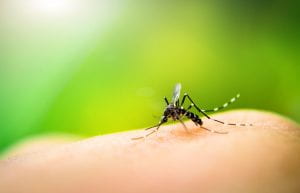 In much of the United States, it’s mosquito season. It can be disappointing to sit down to dinner on your deck only to find yourself covered in itchy, red welts the next day. But you don’t have to let mosquitos chase you back inside.
In much of the United States, it’s mosquito season. It can be disappointing to sit down to dinner on your deck only to find yourself covered in itchy, red welts the next day. But you don’t have to let mosquitos chase you back inside.
It turns out, there is quite a bit of evidence on controlling mosquito populations and avoiding bites. The American Mosquito Control Association offers some solid advice for reducing mosquito populations in your backyard. The basic idea is to eliminate any standing water around your house where mosquitos can breed.
Mosquitos can lay hundreds of eggs in as little as a quarter-inch of standing water, so it’s important to think about all of the places where there may be standing water around your house. Some common sources are old tires, buckets, unused plastic swimming pools or water toys, tarps covering a boat or pool, the saucers of flower pots, and pet dishes. It’s important not to let water accumulate in any of these places for more than two days.
Rain gutters and standing water around faucets and air conditioners can also serve as mosquito breeding grounds.
If you have a bird bath, changing the water in it at least once a week will interrupt the mosquito breeding cycle. If you have an ornamental pond or pool, you can stock it with mosquito fish, a type of minnow that will eat the mosquito larva, or you can treat it with a chemical to kill the larva.
If you have swampy areas in your yard or reoccurring puddles, consider filling them to prevent standing water.
Even after eliminating as many mosquito breeding grounds as possible, you may find some mosquitos lingering in your yard. Chemical repellents such as DEET are an option, but there is some evidence that their use can lead to chronic health problems over the long term, especially for pregnant women and children.
There is another completely safe method: using a fan outdoors.
This works because mosquitoes are relatively weak fliers – reaching speeds of only 1.5 miles per hour and weighing only a few milligrams. In contrast, a typical house fan blows at about 15 miles per hour, easily overpowering mosquitoes.
For more information on mosquitoes, the American Mosquito Control Association has published a fascinating FAQ page that includes evidence-based information on bug-related topics including bug zappers, ultrasonic devices, and bats.



Speak Your Mind